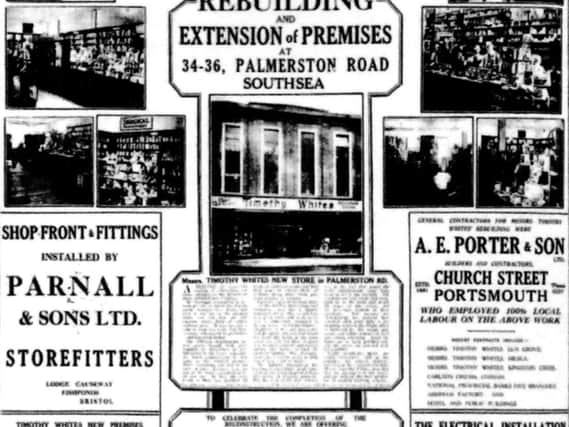These trades were part of Portsmouth's fabric


We left school aged 15 on a Wednesday and on the following Monday we started work.
Some better-off families could afford to let their children stay on to get a higher level of education certificate.
Advertisement
Hide AdAdvertisement
Hide AdThough most secondary modern boys and girls never had that luxury. The elder children had to leave school to help out with the family income.
Some boys managed to get an apprenticeship, if lucky, within the Portsmouth Dockyard or perhaps with Airspeed at Portsmouth Airport or perhaps they joined one of the services or police force.
You could join the Royal Navy at 15 years and six months.
I know many left home to join the forces as it was one less mouth to feed. Others joined the railway or Portsmouth Corporation buses as conductors, later becoming drivers.
There were always plenty of jobs about if you weren't too ambitious. During the 1950s and '˜60s it was a time of '˜Never having it so good' according to prime minister Harold Macmillan.Â
Advertisement
Hide AdAdvertisement
Hide AdI am sorry to say I know several people in their mid-30s who have no concept of going to work. Â
When I tell these people that I used to leave home at 4.20am and catch the train to London at 4.50am, arriving at 6.30am, and arriving home at 7.30pm some 15 hours after I left, sometimes 13 days on the trot, they look at me in amazement.
I say all this as Philip MacDougall has just published a book called Portsmouth at Work. People and Industries Through the Years and it is a marvellous collection of the hundreds of occupations local people worked at for sometimes 50 years or more.
Well illustrated with photographs and etchings, Philip guides us through the life of Portsmouth and its people from the pre-industrial age through to the present day when everyone worked or went without.Â
Advertisement
Hide AdAdvertisement
Hide AdMuch of it is focused on the dockyard and the civilian workforce but many other trades are written about.
Brewing, the entertainment industry with the many theatres and cinemas, ferrymen on Isle of Wight boats, brick-making and journalism are all covered.
The advert, above, shows the many trades involved with the refurbishing Timothy Whites in Palmerston Road. So many employment possibilities.Â
n Last Saturday I attended the 79th memorial service to HMS Royal Oak held in St Barbara's Church on HMS Excellent, Whale Island. The battleship went down on October 14, 1939 with the loss of  834 officers, men and boys.Â
Advertisement
Hide AdAdvertisement
Hide AdOrganised by Gareth Derbyshire, the service was attended by 50 relatives and members of the HMS Royal Oak Association.
The Last Post / Reveille was blown by Neil Sylvester, R.M. (Rtd)
With next year commemorating the 80th anniversary of the loss Gareth is hoping for a large attendance.
n Many of you who read my columns are naval types and, no doubt, destroyer men.
Advertisement
Hide AdAdvertisement
Hide AdThe man whose company built many of the Type 21, Type 22, Type 23 and Type 45 and remains involved with the Type 26 frigate in its Govan yard has died.
Sir Eric Yarrow became chairman of the company on the death of his father, Sir Harold. The company was responsible for building some of the fastest destroyers ever deployed in the Royal Navy.
When orders became thin on the ground Sir Eric visited Thailand,Malaysia, India, Portugal Iran, Ghana, Peru and South Africa to obtain ship orders.
He also instigated the development of the covered berth, such as we have in Portsmouth Naval Base, to enable ships to be built in relative comfort as opposed to working in Scotland's freezing winter conditions.
Sir Eric, born April 1920, died September 22, 2018.
Â